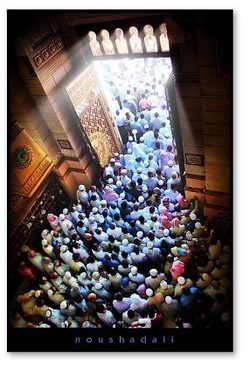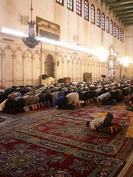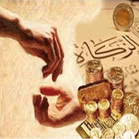About Islam & The Prophet Mohammed (PBUH))
“Truly, the religion with Allâh (SWT, سبحانه وتعالى) is Islâm...” (Reference:: Qur'ân 3:19)
“He it is who has sent His Messenger (Mohammed (PBUH, SAW, صلى الله عليه وسلم)) with guidance and the religion of truth (Islâmic Monotheism) to make it victorious over all (other) religions even though the mushrikûn (polytheists, pagans, idolaters, and disbelievers in the Oneness of Allâh (SWT, سبحانه وتعالى) and in His Messenger Mohammed (PBUH, SAW, صلى الله عليه وسلم) hate (it).” (Reference: Qur'ân 61:9)
“Truly, the religion with Allâh (SWT, سبحانه وتعالى) is Islâm...” (Reference:: Qur'ân 3:19)
“He it is who has sent His Messenger (Mohammed (PBUH, SAW, صلى الله عليه وسلم)) with guidance and the religion of truth (Islâmic Monotheism) to make it victorious over all (other) religions even though the mushrikûn (polytheists, pagans, idolaters, and disbelievers in the Oneness of Allâh (SWT, سبحانه وتعالى) and in His Messenger Mohammed (PBUH, SAW, صلى الله عليه وسلم) hate (it).” (Reference: Qur'ân 61:9)

The Prophet Mohammed (also spelled Muhammad, Muhammad, Mohammad), Peace Be Upon Him (PBUH, SAW, صلى الله عليه وسلم) was chosen by God (SWT, سبحانه وتعالى) to deliver His Message of Peace, namely Islam. Mohammed (PBUH, SAW, صلى الله عليه وسلم) is considered to be the summation and the culmination of all the prophets and messengers that came before him. He purified the previous messages from adulteration and completed the Message of God (SWT, سبحانه وتعالى) for all humanity. Clearly Islam encompasses many of the same prophets as Judaism and Christianity, in fact all three religions (the monotheistic faiths) trace their roots back to Abraham (AS, عليه السلام), and all three religions consider Abraham (AS, عليه السلام) a prophet. There are also many other similarities among these three religions. All of the monotheistic faiths originated in what is known today as the Arab World and more specifically, within an area that spans no more than 300 miles. An emphasis on family values, charity and respect for others are shared by these three religions. A central principle of all three faiths is the belief in one God. There is a belief in angels, prophets, an afterlife, holy scriptures and a holy Messiah who will address the world. Significantly, all three faiths believe the Messiah will return to the region from where these religions originated.
The word “Islam” refers to the religion/faith, and the word “Muslim” refers to a person who follows the Islamic faith. The word “Islam” is derived from the root word aslama meaning “to submit peacefully.” Central to the core of Islam are the concepts of “peace” and “submission.” The submission is only to God (SWT, سبحانه وتعالى), the creator and sustainer of all that exists, seen and unseen. Muslims are not to be confused with Arabs. Muslims may be Arabs, Americans, or any other nationality.
Allâh (SWT, سبحانه وتعالى) is the Arabic word for the one God that all Muslims, Christians, and Jews believe in.
The documented sources of Islam are the Qur'ân (also spelled Koran) and hadith. The Qur'ân is the exact word of Allâh (SWT, سبحانه وتعالى) as revealed to the Prophet Mohammed (PBUH, SAW, صلى الله عليه وسلم); its authenticity, originality and totality are intact in Arabic. In addition, the Qur'ân has been preserved by generation after generation of Muslims who have memorized the Qur'ân in Arabic in it’s entirety. Hadith is the report of the sayings (sunnas), deeds, and approvals of the Prophet Mohammad (PBUH, SAW, صلى الله عليه وسلم). The life of the Prophet (PBUH, SAW, صلى الله عليه وسلم) is documented as seerah and provides examples of daily living for Muslims.
The word “Islam” refers to the religion/faith, and the word “Muslim” refers to a person who follows the Islamic faith. The word “Islam” is derived from the root word aslama meaning “to submit peacefully.” Central to the core of Islam are the concepts of “peace” and “submission.” The submission is only to God (SWT, سبحانه وتعالى), the creator and sustainer of all that exists, seen and unseen. Muslims are not to be confused with Arabs. Muslims may be Arabs, Americans, or any other nationality.
Allâh (SWT, سبحانه وتعالى) is the Arabic word for the one God that all Muslims, Christians, and Jews believe in.
The documented sources of Islam are the Qur'ân (also spelled Koran) and hadith. The Qur'ân is the exact word of Allâh (SWT, سبحانه وتعالى) as revealed to the Prophet Mohammed (PBUH, SAW, صلى الله عليه وسلم); its authenticity, originality and totality are intact in Arabic. In addition, the Qur'ân has been preserved by generation after generation of Muslims who have memorized the Qur'ân in Arabic in it’s entirety. Hadith is the report of the sayings (sunnas), deeds, and approvals of the Prophet Mohammad (PBUH, SAW, صلى الله عليه وسلم). The life of the Prophet (PBUH, SAW, صلى الله عليه وسلم) is documented as seerah and provides examples of daily living for Muslims.
The Five Pillars of Islam

The five pillars of Islam comprise five acts considered obligatory for all Muslims. The pillars are noted in the following hadith:
"It is narrated on the authority of ('Abdullah) son of Umar (may Allah be pleased with them) that the Prophet (PBUH, SAW, صلى الله عليه وسلم) said: (The superstructure of) al-Islam is raised on five (pillars), i. e. the oneness of Allâh (SWT, سبحانه وتعالى), the establishment of prayer, payment of Zakat, the fast of Ramadan, Pilgrimage (to Mecca). A person said (to 'Abdullah b. Umar the narrator): Which of the two precedes the other-Pilgrimage or the fasts of Rarnadan? Upon this he (the narrator) replied: No (it is not the Pilgrimage first) but the fasts of Ramadan precede the Pilgrimage." (Reference: Hadith in Muslim collection Book 1 Number 18). See also Hadith in Bukhari collection Volume 1 Book 2 Number 8 (also numbered as Book 1 Volume 2 Hadith 7), Hadith in Muslim collection Book 1 Number 19, Hadith in Muslim collection Book 1 Number 20, Hadith in Muslim collection Book 1 Number 21, Hadith in the Muslim collection Book 1 Number 23, and Bukhari Book 1 Volume 2 Hadith 51 (also numbered as Book 1 Volume 2 Hadith 50).
These pillars are listed below.
1. Creed (Shahada): Believing and testifying that there is only One God (and that one God is Allâh SWT, سبحانه وتعالى), and that Mohammed (PBUH, SAW, صلى الله عليه وسلم) is His servant and messenger. Islam rejects the idea of the trinity, which implies more than one God in one, or any Godship association of anything or anyone (e.g. partner or son) with Allâh (SWT, سبحانه وتعالى). This declaration is required for one to convert to Islam. The below references from the Qur'an support the second portion of the Shahada.
"It is narrated on the authority of ('Abdullah) son of Umar (may Allah be pleased with them) that the Prophet (PBUH, SAW, صلى الله عليه وسلم) said: (The superstructure of) al-Islam is raised on five (pillars), i. e. the oneness of Allâh (SWT, سبحانه وتعالى), the establishment of prayer, payment of Zakat, the fast of Ramadan, Pilgrimage (to Mecca). A person said (to 'Abdullah b. Umar the narrator): Which of the two precedes the other-Pilgrimage or the fasts of Rarnadan? Upon this he (the narrator) replied: No (it is not the Pilgrimage first) but the fasts of Ramadan precede the Pilgrimage." (Reference: Hadith in Muslim collection Book 1 Number 18). See also Hadith in Bukhari collection Volume 1 Book 2 Number 8 (also numbered as Book 1 Volume 2 Hadith 7), Hadith in Muslim collection Book 1 Number 19, Hadith in Muslim collection Book 1 Number 20, Hadith in Muslim collection Book 1 Number 21, Hadith in the Muslim collection Book 1 Number 23, and Bukhari Book 1 Volume 2 Hadith 51 (also numbered as Book 1 Volume 2 Hadith 50).
These pillars are listed below.
1. Creed (Shahada): Believing and testifying that there is only One God (and that one God is Allâh SWT, سبحانه وتعالى), and that Mohammed (PBUH, SAW, صلى الله عليه وسلم) is His servant and messenger. Islam rejects the idea of the trinity, which implies more than one God in one, or any Godship association of anything or anyone (e.g. partner or son) with Allâh (SWT, سبحانه وتعالى). This declaration is required for one to convert to Islam. The below references from the Qur'an support the second portion of the Shahada.
“Mohammed (PBUH, SAW, صلى الله عليه وسلم) is not the father of any of your men, but he is the Messenger of Allâh (SWT, سبحانه وتعالى) and the last (end) of the Prophets...” (Reference: Qur'ân 33:40)
"Muhammad (PBUH, SAW, صلى الله عليه وسلم) is the messenger of Allâh (SWT, سبحانه وتعالى). And those with him are hard against the disbelievers and merciful among themselves..." (Reference: Qur'ân 48:29)
"The (true) believers are those only who believe in Allâh (SWT, سبحانه وتعالى) and His messenger (PBUH, SAW, صلى الله عليه وسلم) and afterward doubt not, but strive with their wealth and their lives for the cause of Allâh (SWT, سبحانه وتعالى). Such are the sincere." (Reference: Qur'ân 49:15)

2. Prayers (Salat): Salat refers to the ritualistic prayer that is to be conducted 5 times daily facing the ka’ba (the first sacred house of worship built by Abraham, in Makkah). These prayers serve as public testimony of the believer's submission to Allâh (SWT, سبحانه وتعالى) and adherence to Islam.
For more information on praying, please visit our prayer guide
The angel Gabriel taught the Prophet Mohammed (PBUH, SAW, صلى الله عليه وسلم) how to conduct the prayers (see first hadith below), and the Prophet (PBUH, SAW, صلى الله عليه وسلم) demonstrated to his followers how to conduct the prayers (source: Hadith in Bukhari Volume 9 Book 91 Number 352 also known as Bukhari Book 1 Volume 11 Hadith 604). That the prayers are 5 times a day is reinforced by the following:
For more information on praying, please visit our prayer guide
The angel Gabriel taught the Prophet Mohammed (PBUH, SAW, صلى الله عليه وسلم) how to conduct the prayers (see first hadith below), and the Prophet (PBUH, SAW, صلى الله عليه وسلم) demonstrated to his followers how to conduct the prayers (source: Hadith in Bukhari Volume 9 Book 91 Number 352 also known as Bukhari Book 1 Volume 11 Hadith 604). That the prayers are 5 times a day is reinforced by the following:
"...Abu Mas'ud say that he heard Abu Mas'ud say that he heard the Messenger of Allah (may peace be upon him) say: Gabriel came down and acted as my Imam, then I prayed with him, then I prayed with him, then I prayed with him. then I prayed with him. then I prayed with him. reckoning with his fingers five times of prayer." (Reference: Hadith related by Ibn Shibab in Muslim Collection Book 004, Number 1268).
"And perform as-salât (iqâmat-as-aalât), at the two ends of the day and in some hours of the night [i.e. the five compulsory salât (prayers)]. Verily, the good deeds remove the evil deeds (i.e. small sins). That is a reminder (an advice) for the mindful (those who accept advice)." (Reference: Qur'ân 11:114)
"Perform as-salât (iqamât-as-salât) from mid-day till the darkness of the night (i.e. the Dhuhr, 'Asr, Maghrib, and 'Ishâ' prayers), and recite the Qur'ân in the early dawn (i.e. the morning prayer). Verily, the recitation of the Qur'ân in the early dawn is ever witnessed (attended by the angels in charge of mankind of the day and the night)." (Reference: Qur'ân 17:78)
"So bear patiently (O Mohammed (PBUH, SAW, صلى الله عليه وسلم)) what they say, and glorify the praises of your Lord (Allâh, SWT, سبحانه وتعالى) before the rising of the sun, and before its setting, and during some hours of the night, and at the ends of the day (an indication for the five compulsory congregational prayers), that you may become pleased with the reward which Allâh (SWT, سبحانه وتعالى) shall give you." (Reference: Qur'ân 20:130)
3. Fasting (sawm): Fasting from food, drink, and marital relations during the daylight hours of the lunar month of Ramadan.
For more information on Ramadan, please visit our Ramadan page.
For more information on Ramadan, please visit our Ramadan page.
“O you who believe! Observing as-saum (the fasting) is prescribed for you as it was prescribed for those before you, that you may become al-muttaqûn (the pious).”(Reference: Qur'ân 2:183).

4. Almsgiving (Zakat): Giving a small percentage (2.5%) of one's saved/surplus wealth to the poor every year. Zakat is only required of non-poor Muslims in order to draw closer the disparity and financial gap between them and the poor, needy, and destitute Muslims. The Qur'ân both instructs almsgiving and also defines who should receive the contributions. For more information about zakat, we recommend visiting this page.
"And they were commanded not, but that they should worship Allâh (SWT, سبحانه وتعالى), and worship none but Him Alone (abstaining from ascribing partners to Him), and perform as-salât (iqâmat-as-salât) and give zakât: and that is the right religion." (Reference: Qur'ân 98:5)
"As-sadaqât (here it means zakât) are only for the Fuqarâ' (poor), and al-masâkin (the poor) and those employed to collect (the funds); and to attract the hearts of those who have been inclined (towards Islâm); and to free the captives; and for those in debt; and for Allâh's (SWT, سبحانه وتعالى) cause (i.e. for mujâhidûn - those fighting in the holy battle), and for the wayfarer (a traveller who is cut off from everything); a duty imposed by Allâh (SWT, سبحانه وتعالى) . And Allâh (SWT, سبحانه وتعالى) is All-Knower, All-Wise." (Reference: Qur'ân 9:60)

5. Pilgrimage (Hajj): Performing pilgrimage at least once in one's life, for those who are physically and financially capable. Hajj takes place from the 8th (reference: Hadith in Bukhari Volume 2, Book 26, Number 623) through the 13th of the lunar Islamic month Dhu al-Hijja (see Qur'an 2:189), which is the last month of the Islamic year. The holiday Eid al Adha is from the 10th through 13th of the month, therefore takes place during Hajj. There are specific acts required during hajj and were demonstrated by the Prophet Mohammed, PBUH, SAW, صلى الله عليه وسلم) to his followers. This ritual of pilgrimage stretches back thousands of years to the time of Abraham.
Hajj is noted several times in the Qur'an in addition to references in the 5 pillars. Hajj is emphasized in Qur'an 2:125, Qur'ân 22:26-27.
Hajj is noted several times in the Qur'an in addition to references in the 5 pillars. Hajj is emphasized in Qur'an 2:125, Qur'ân 22:26-27.
About the Prophet Mohammed (PBUH, SAW, صلى الله عليه وسلم)
Mohammed ibn Abdullah (often referred to by just his first name Mohammed or as the Prophet Mohammed, PBUH, SAW, صلى الله عليه وسلم) was born in 570 C.E. in Makkah, Arabia and died in 632 C.E. Through the angel Gabriel (Jibril), Allâh (SWT, سبحانه وتعالى) revealed the Qur'ân to Mohammed (PBUH, SAW, صلى الله عليه وسلم) over the course of 23 years. During this time, as with all the prophets before him, Mohammed (PBUH, SAW, صلى الله عليه وسلم) taught the people to worship Allâh (SWT سبحانه وتعالى) as the one and only God (SWT, سبحانه وتعالى), who had no partners, intermediaries, sons or daughters.
Sunni vs. Shi’a (Sheite)
The two primary sects of Islam are Sunni and Shi’a (also spelled Shia, Sheite). Both sects adhere to the basic Islamic beliefs. These sects were developed as a result of political strife at the time of the death of the Prophet Mohammed (PBUH, SAW, صلى الله عليه وسلم) over who was to take leadership of the Muslims. Over the centuries, the practices and positions between the two sects have grown differences in primarily minor details.
For additional information, we recommend visiting: http://islam.about.com/cs/divisions/f/shia_sunni.htm. For a table comparing Sunni vs Shi'a, visit http://www.religionfacts.com/islam/comparison_charts/islamic_sects.htm.
Religious leaders in Islam
Formal or informal leaders exist in Judaism, Christianity, and Islam.
The leaders in Islam do not require any religious ordination and do not any have any legitimate power. Imams are generally scholars of religion and often lead prayers and provide guidance. Islam does not believe in intermediaries between God (SWT, سبحانه وتعالى) and humans.
- Judaism: Leaders such as rabbis, cantors.
- Christianity: Clergy such as priests, ministers, pastors, deacons, and bishops.
- Islam: Leaders such as imams (إمام). Sunni also includes mufti (مفتي) and muala (مولى); In Shia Islam are ulema (علماء) imams.
The leaders in Islam do not require any religious ordination and do not any have any legitimate power. Imams are generally scholars of religion and often lead prayers and provide guidance. Islam does not believe in intermediaries between God (SWT, سبحانه وتعالى) and humans.
Comparison between monotheistic religions
Some of the differences and many similarities between Islam and Judaism and Christianity have been noted above. In addition, below is a high-level comparison between the three religions. Information was attained from this website.
| Islam |
Judaism |
Christianity |
|
| Current adherents | 1.3 billion (2nd largest) |
14 million (12th largest) |
2 billion (largest) |
| Type of theism | Strict monotheism |
Strict monotheism |
Trinitarian monotheism |
| Name of same God worshipped by all 3 | Allah (SWT, سبحانه وتعالى) |
Yahweh, Elohim (SWT, سبحانه وتعالى) |
Yahweh (SWT, سبحانه وتعالى), the Holy Trinity
|
| Other spiritual beings | Angels, demons, jinn |
Angels and demons |
Angels and demons |
| Identity of Jesus (AS, عليه السلام) |
True prophet of God (SWT, سبحانه وتعالى), whose true original message later got corrupted |
False prophet |
Son of God (SWT, سبحانه وتعالى), God (SWT, سبحانه وتعالى) incarnate, died to save Christians from their sins |
| Human nature | Equal ability to do good or evil |
Two equal impulses, one good and one bad |
"Original sin" inherited from Adam
- tendency towards evil |
| Means of salvation | Correct belief, good deeds, Five Pillars |
Belief in God (SWT, سبحانه وتعالى), good deeds |
Correct belief, faith, good deeds, sacraments
(some Protestants emphasize faith alone) |
| God's (SWT, سبحانه وتعالى) role in salvation | Predestination |
Divine revelation and forgiveness |
Predestination, various forms of grace |
| Good afterlife | Eternal paradise |
Views vary: either heaven or no afterlife |
Eternal heaven |
| Bad afterlife | Eternal hell |
Views vary: either eternal Gehenna, reincarnation,
or no afterlife |
Eternal hell, temporary purgatory (Catholicism)
|
| View of fellow Abrahamic religions | Jews and Christians are respected as "People
of the Book," who received 1st revelation as part of the
monotheistic chain that was to be concluded with Prophet Mohammed,
and with corruption over time they now have wrong beliefs |
Islam and Christianity are false interpretations
and extensions of Judaism. |
Judaism is a true religion, but with incomplete
revelation. Islam is a false religion. |